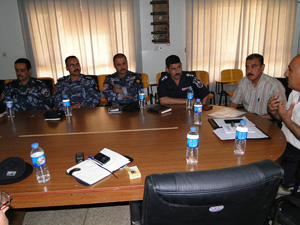USIP’s programs in Iraq aim to develop local capacities in conflict resolution and the rule of law. In that respect, USIP’s Iraq Priority Grant program supports a nongovernmental organization (NGO) based in the northern city of Kirkuk in its work to enhance community relations with the law enforcement units in this ethnically diverse city.

Some consider Kirkuk to be a microcosm of Iraq because of the various communities that call it home.
With a grant from USIP, this NGO seeks to mitigate a potential ethnic conflict by employing a set of preventive measures. Specifically, the NGO is training policemen on conflict resolution, human rights and tolerance. It is also holding regular community meetings to bridge “credibility gaps” and build trust between the police and the members of Kirkuk’s ethnically diverse community. During these meetings, police representatives acknowledged that there are shortcomings in the conduct of the police and discussed ways to rectify them.
In addition, the NGO undertook training programs that involved 128 policemen and 137 community members. One outcome was the formation of a joint committee with the police and community that is specifically tasked with resolving issues between the two groups.
USIP’s grantee has achieved excellent rapport with police units and the police academy. The project allowed the organization members to gain an insider’s view of the complex working environment of the police in Kirkuk. It observed the harsh working conditions, long schedules and inadequate benefits for police officers. As a result, the organization was able to diagnose poor working conditions among police as contributing to poor performance in their interactions with the community.
 |
| Iraqi police officers receive training on conflict resolution and human rights in Kirkuk, Iraq by a local NGO |
Entering uncharted territory for an Iraqi civil society organization, it approached the police command to negotiate better working conditions for policemen and request compensation for the families of fallen officers. Thus far, the mediation efforts have been successful, resulting in the completion of 77 applications for compensation and retirement.
Consequently, for the first time, a local NGO was able to mediate and resolve work-related conflicts between policemen and their supervisors through the targeted training sessions. It also appealed to the Kirkuk Health office to provide special healthcare services for policemen especially those injured in terrorist attacks while on duty, and mental health programs to help them cope and facilitate their return to work. As further testament to the NGO’s good work, the Directorate General of Police in Kirkuk requested that the organization formally provide training to 40 police officers on human rights at the police headquarters. Senior officials there were so impressed that they asked to extend the training to the rest of the staff.
The NGO’s director said, “I think it is a very good sign of improving relationships between government and civil society that will make a positive difference in the functioning of the security sector in Iraq.”
The NGO achieved remarkable improvements in police community relations, helping to mitigate a problem that has contributed to perceptions of insecurity and vulnerability among residents of a strategically vital and politically volatile city.
Its mission advances USIP’s overall mandate in Iraq and has the ancillary benefit in supporting the U.S.’s long-term investment in a peaceful and stable Iraq. By ensuring local, credible, and well-trained law enforcement capacities in Iraq, USIP helps facilitate the return of U.S. troops home. USIP’s work in Iraq helps in reducing violence and provides mechanisms for local communities to resolve conflicts and prevent them from reoccurring.



